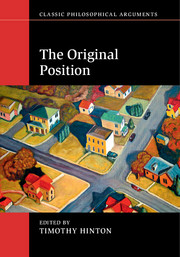Book contents
- Frontmatter
- Contents
- List of contributors
- Acknowledgments
- List of abbreviations
- Introduction: the original position and The Original Position – an overview
- 1 Justice as fairness, utilitarianism, and mixed conceptions
- 2 Rational choice and the original position: the (many) models of Rawls and Harsanyi
- 3 The strains of commitment
- 4 Our talents, our histories, ourselves: Nozick on the original position argument
- 5 Rawls and Dworkin on hypothetical reasoning
- 6 Feminist receptions of the original position
- 7 G. A. Cohen's critique of the original position
- 8 Liberals, radicals, and the original position
- 9 The original position and Scanlon's contractualism
- 10 The “Kantian roots” of the original position
- 11 Stability and the original position from Theory to Political Liberalism
- 12 The original position in The Law of Peoples
- References
- Index
8 - Liberals, radicals, and the original position
Published online by Cambridge University Press: 05 December 2015
- Frontmatter
- Contents
- List of contributors
- Acknowledgments
- List of abbreviations
- Introduction: the original position and The Original Position – an overview
- 1 Justice as fairness, utilitarianism, and mixed conceptions
- 2 Rational choice and the original position: the (many) models of Rawls and Harsanyi
- 3 The strains of commitment
- 4 Our talents, our histories, ourselves: Nozick on the original position argument
- 5 Rawls and Dworkin on hypothetical reasoning
- 6 Feminist receptions of the original position
- 7 G. A. Cohen's critique of the original position
- 8 Liberals, radicals, and the original position
- 9 The original position and Scanlon's contractualism
- 10 The “Kantian roots” of the original position
- 11 Stability and the original position from Theory to Political Liberalism
- 12 The original position in The Law of Peoples
- References
- Index
Summary
The role of the original position in the dispute between liberals and radicals
Although political philosophy has been dominated by liberalism ever since the publication of TJ, this hegemony has not gone unchallenged by radicals. For the most part, the disputes between liberals and radicals have focused on matters of principle, including deep disagreements over how best to understand the central values of liberty and equality. As significant as these substantive disagreements are, there are equally important methodological differences between liberals and radicals that have not been the focus of as much philosophical attention.
In this chapter, I want to show how Rawls's political philosophy, in particular, is animated by certain key assumptions about history and social theory that radicals can and should contest. Because these deeper assumptions shape our understanding of questions of principle, I shall treat them in tandem with a substantive dispute between liberals and radicals over the content of constitutional liberties. My aim is to use the lens of the original position as a way to scrutinize these assumptions in order to bring out their connection with principles of justice. My thesis is that our commitments in social theory profoundly shape our principles.
I begin by examining Rawls's original position argument for a set of distinctively liberal freedoms. I will then interrogate some of the key background stipulations that work to support Rawls's case for those freedoms. I will then indicate how radicals can reasonably contest those stipulations, proceeding to show how that contestation would play out in an original position framework more congenial to radicals.
The primacy of the liberal freedoms
I begin with Rawls's defense of the primacy in justice of the liberal freedoms. We should bear in mind that Rawls never wavered in his belief that whether or not people can correctly be said to be free is “determined by the rights and duties established by the major institutions of [their] society” (TJ, p. 63, my emphasis). I take this to show that the dominant conception of liberty in Rawls's work is form of liberal legalism. According to liberal legalism, taken here to be a distinctive view of liberty, there is no such thing as liberty per se, there are only basic liberties, understood as fundamental legal rights to be free from certain specified restrictions.
- Type
- Chapter
- Information
- The Original Position , pp. 159 - 178Publisher: Cambridge University PressPrint publication year: 2015

